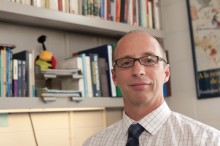Jonathan Walsh travels to Senegal to study francophone literature of West Africa

Over the centuries, France has produced some of the world’s greatest writers. Today, many of the most exciting authors writing in French come from other parts of the world—notably, the French Antilles and the former French colonies of West Africa. “There is a renaissance of sorts going on there, especially in sub-Saharan countries like Senegal, Mali, Ivory Coast and Burkina Faso,” says Professor of French Jonathan Walsh, who teaches a popular course on contemporary francophone women’s fiction. “The relationship these authors have to the French language is complex and not always easy. Some choose to write in their native language, but French, like English, has become a lingua franca, and that means access to a wide readership.” With the support of a fellowship from the Marion and Jasper Whiting Foundation, Walsh traveled to Senegal in February-March of this year to experience the rich cultural milieu of West Africa firsthand. The Whiting Foundation, based in Boston, aims to support scholarship and travel that improve and enhance the quality of classroom instruction.
“I’ve been teaching African literature as an ‘armchair traveler,’” Walsh remarks. “I really need a better sense of the culture and context.” Walsh’s says his three-week visit to Senegal in early 2012 will enhance his courses and allow him to explore new connections between Wheaton’s courses and the cultures of that part of the world. Since 1997 Walsh has taught “Other Voices, Other Stories: Great Works by Women from France and the Francophone World,” a course of particular interest to students in French studies, Women’s Studies and a relatively new major, African, African-American and Diaspora studies. “The course focuses on questions of gender, race and narrative form in the fiction and poems of female authors from France and its former colonies,” says Walsh, and “it has helped me to discover a wealth of new literature…that I want very much to explore and follow more closely.”
Walsh has read and researched francophone African women writers on his own, but apart from attending a conference in Tunisia, had not visited their native lands. “To teach such a course with the requisite knowledge and authority, to take it to the next level, I feel strongly the need to experience African cultures firsthand,” he wrote in his fellowship application.
-
Categories:
- French Studies